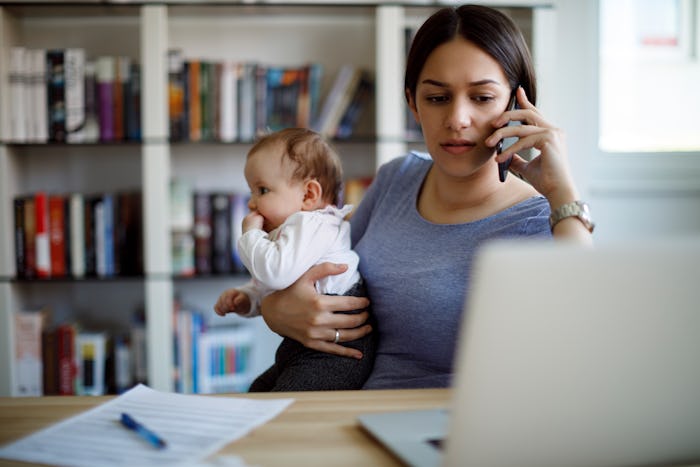News

An Alarming 50% Of Parents Are Without Child Care During The Pandemic
In an effort to bring awareness to the unique needs of working parents during the coronavirus outbreak, the family support and benefits platform Cleo has teamed up with Happiest Baby, the Mom Project, and Paid Leave for the United States (PL+US) to publish a report detailing COVID-19's impact on families. And what they found was that the pandemic has left an alarming number of parents without child care, leading some to consider leaving the workforce entirely.
Cleo's report found that working families across the country have been dramatically impacted by the changes the ongoing coronavirus pandemic. While school closures have demanded many parents step in as homeschool educators, the forced closure of many non-essential businesses has resulted in job loss or a transition to a work-from-home model. Social distancing and stay-at-home orders have radically changed new parents' birth and postpartum plans and interrupted child care plans. As a result, many working parents are struggling to cover more roles with fewer resources than ever before.
In an April survey of 246 working parents (all of whom are Cleo members) employed at large enterprise companies, Cleo found that more than 50% reported being without child care as a result of the COVID-19 pandemic. What's more, 1 in 5 working parents, or 20%, said that either they or their partner were considering leaving the workforce in order to care for their children.
But while a majority of working parents are grappling with a loss of child care, Cleo found that loss is likely disproportionately impacting working mothers. In a separate study regarding the impact of COVID-19 on gender equality — which Cleo analyzed as part of their report — researchers found that full-time working mothers in two-parent households logged, on average, 22 hours of child care a week during the coronavirus pandemic. That's 22 hours of child care on top of the hours of work their full-time job also requires of them. That same study noted that, prior to the coronavirus pandemic, married couples with children tended to divide child care unequally with men providing 7.4 hours of child care per week on average compared to women's 13.3 hours per week. Researchers said it was "likely" that this uneven distribution of child care duties has persisted during the pandemic.
For many working parents, the statistics cited in Cleo's report won't come as a surprise. This is the reality of their daily life, after all. But for employers, the coronavirus outbreak has brought into sharper focus the unique needs and challenges of working parents.
"I feel like COVID was the point that everyone was forced to reckon with the fact that the working family doesn't really work very well," Cleo CEO Sarahjane Sacchetti told The San Francisco Chronicle. Sacchetti argued that, "COVID took [the] duct-tape safety net away" from the many working parents already struggling to keep up with both their jobs and their children's needs.
That's why she, Cleo and the rest of the companies behind this new report aren't simply looking to show how working parents have been impacted by COVID-19, but rather find ways to help employers alleviate the burden. Already, Salesforce, PepsiCo, Uber, Box, Pinterest, Zoom, Okta, Alexis Ohanian, GV, NEA, Greylock, Pure Storage, UrbanSittter, Winnie, Cloudflare, Niantic, The Wing, Cora, and The Detox Market have signed on as the coalition's founding pledge signatories, committing to investing in parents by supporting policies that help working parents not only remain in the workforce, but thrive in it.
Pledge signatories are expected to meet with the coalition to identify the challenges facing working parents and create a series of policy and workforce recommendations, which will be released at the end of May and June.
If you think you’re showing symptoms of coronavirus, which include fever, shortness of breath, and cough, call your doctor before going to get tested. If you’re anxious about the virus’s spread in your community, visit the CDC for up-to-date information and resources, or seek out mental health support. You can find all of Romper’s parents + coronavirus coverage here, and Bustle’s constantly updated, general “what to know about coronavirus” here.